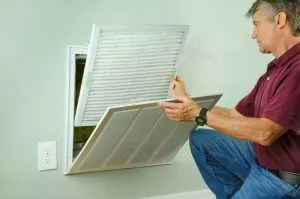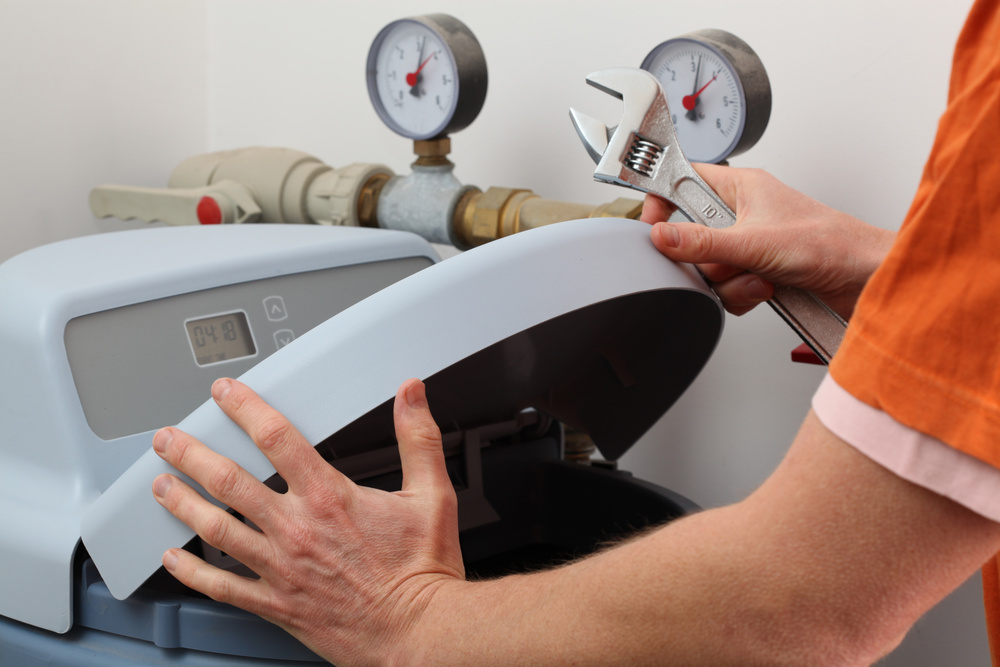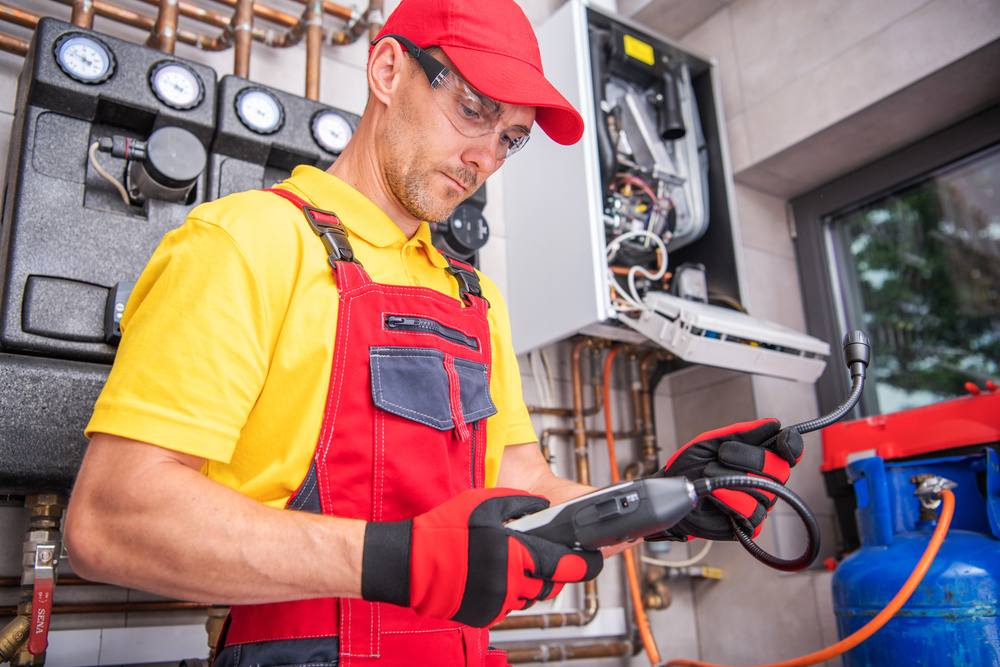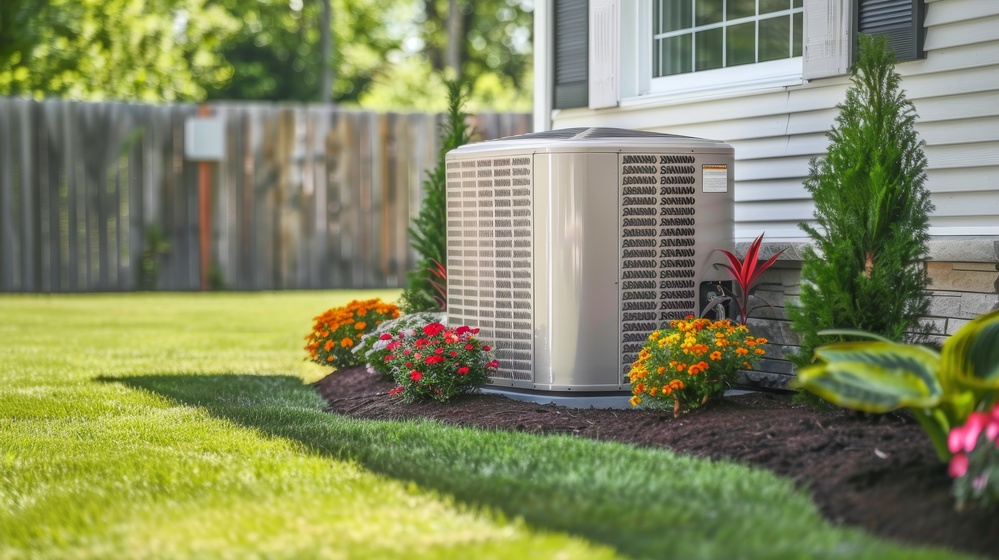How Often Should I Change My Air Filter? Everything You Need to Know

By Thomas Terry, SameDay Heating & Air
Changing your air filter may seem small, but it plays a huge role in keeping your home cool in the summer and warm in the winter. It is also essential if you want your HVAC system to work at its highest efficiency and last as long as it should. A clean air filter has important benefits in your home, including: improved indoor air, less dust and fewer allergens, & ;ess work for your heating and cooling.
Why Air Filters Matter in Your Home
Your air filter does more than just collect dust. It keeps your home’s air clean and your HVAC system running efficiently. Have you ever wondered what your filter does, or why it needs changing? We’ll cover the basics below.
How Do Air Filters Impact HVAC Performance & Indoor Air Quality
Air filters do two important jobs: they clean the air in your home and help your HVAC system run properly. By trapping dust, pollen, pet hair, and other small particles, your filter keeps them from floating around and landing on your furniture.
Air filters also protect your heating and cooling system from buildup that causes clogs and damage. When your filter is clean, air flows freely, and your system doesn’t have to work overtime to heat or cool your home.
If the filter gets too dirty, airflow slows down. This forces your system to work harder and use more energy, leading to uneven temperatures, higher utility bills, and possible breakdowns. Keeping the filter fresh helps your home feel more comfortable and keeps your air healthier.
How Often Should You Replace Your Air Filter?
How often you should change your air filter depends on your home, lifestyle, and even the outside air. Below are a few things to think about when deciding how often to make the change.
How Often Should You Change Your Air Filter in Salt Lake City?
Salt Lake City homeowners deal with unique air quality issues, especially during inversion season. This is when a layer of warm air sits above a layer of cold air, typically during winter. So it’s extra important to change your filter regularly to keep the air inside fresh and your HVAC system running strong.
Here’s a breakdown based on your home situation:
| Home Type or Condition | Recommended Replacement Schedule |
|
Vacation Home |
Every 6-12 months |
|
Single-Occupant Home (No Pets/Allergies) |
Every 6-12 months |
|
Average Suburban Home Without Pets |
Every 90 days |
|
Average Suburban Home with 1 Pet |
Every 60 days |
|
Average Suburban Home with More than One Pet |
Every 20-45 days |
|
During Salt Lake City Inversion Season |
Monthly |
Can I Go Longer Than 90 Days Without Replacing My Air Filter?
You may be able to stretch the timeline, especially if you live alone, don’t have pets, and don’t deal with allergies. Some filters can last a bit longer in clean, low-traffic homes.
However, if someone in your house has allergies or if you notice your air feels stale or dusty, it’s better to change the filters sooner. Sticking to the 60-90 day range keeps your system clean and your air fresh.
Can I Run My Air Conditioner System Without an Air Filter?
Technically, your system will still run without a filter, but it’s not worth the risk. Without a filter, dust and debris get pulled straight into your HVAC unit, leading to buildup, damaged parts, and costly repairs in the future.
You’ll also lose the benefit of clean air. A missing filter means everything floating in your home (i.e. dust, pollen, and pet hair) keeps circulating.
What Factors Impact the Lifespan of My Air Filter?
Not every filter wears out at the same rate. A few things can shorten or expand how long yours last:
- Pets: More pets = more hair and dander
- Allergies or Asthma: Clean filters help reduce symptoms
- Home Size: Bigger homes push more air through the system
- Number of People in the Home: More people mean more dust and particles
- Location and Air Quality: Pollution, smoke, or construction clogs filters faster.
- HVAC System Use and Age: Older systems or those running often may need more frequent changes.
- Filter Type: Some filters are designed to last longer than others.
Types of Air Filters and Their Lifespans
Not all air filters are the same. Some are made to catch big particles like dust and air, while others can trap tiny allergens and even bacteria. Your chosen type affects how clean your air stays and how often you must replace it.
Here’s a quick look at the most common types of air filters:
|
Type of Filter |
Typical Lifespan |
Features |
|
Fiberglass |
30 days |
Budget-friendly, basic filtration, not ideal for allergies |
|
Pleated (Polyester) |
45-90 days |
Better particle capture, good balance of cost and performance |
|
HEPA |
Up to 12 months |
Excellent for allergies, traps very fine particles |
|
Washable (Reusable) |
Several years |
Eco-friendly, must be cleaned and dried regularly |
Look at the MERV rating (Minimum Efficiency Reporting Value) when shopping. The higher the number, the better the filter catches small particles. However, check what your HVAC system can handle before choosing one that’s too restrictive.
How to Tell if You Need to Change Your Air Filter
Are you not sure if it’s time to replace your air filter? You don’t always have to rely on a schedule. Your home may be showing signs it’s overdue. Here are a few easy ways to check if your filters need changing.
Examine for Visible Dirt or Discoloration
Take a look at your air filter. If it looks gray, dusty, or clogged, it’s time for a change. A clean filter will usually be white or off-white. When it gets dirty, it can’t trap as much dust or particles, and airflow starts to suffer.
Less Effective HVAC Performance
If some rooms in your house are hotter or colder than others, a clogged filter could be the culprit. When air can’t move freely through your system, you’ll begin to notice uneven temperatures or weak airflow from the vents.
Your system might also start cycling more often or seem to run longer than usual. That’s its way of compensating for the restricted airflow. Changing the filter will usually fix these issues immediately.
Unusually High Energy Bills
If your energy bills suddenly go up and you haven’t changed your habits, your air filter may be the cause. A clogged filter makes your HVAC system work harder than it should, and that extra effort shows up on your utility bills.
Before calling for a repair or inspection, check your filter. Swapping it out is a quick, inexpensive fix that quickly gets things back on track.
How to Check & Replace Your Air Filter
Changing your air filter is easier than you might think. We’ll guide you through how to check your filter, swap it out, and keep your HVAC system in good shape. Here’s how to get it done.
Buy the Right Filter Size
First, check your current filter or your HVAC system manual to find the correct size. Filters are labeled with dimensions like 16x25x1, and using the wrong size reduces airflow and leaves gaps for dust to sneak through.
It might be tempting to grab whatever fits, but getting the exact size can make a huge difference in performance. It helps your system run more efficiently and keeps your air cleaner.
Find Your Filter, Remove It, & Replace It
Your air filter is usually found near the blower unit of your HVAC system or behind a vent cover, often in a hallway ceiling, wall, or utility room. Once you find it, turn off your HVAC system for safety.
Slide out the old filter and take note of the airflow direction marked on the frame. When putting in the new one, match the arrows on the filter to the system’s airflow.
What Happens if You Don’t Replace Your Filter?
Skipping your air filter change now and then may not seem like an issue, but over time, it causes problems. Here’s what can happen if your filter gets too dirty and stays that way.
Ineffective & Strained HVAC Performance
- A clogged filter makes your system work harder, which can wear it out faster
- Leads to more breakdowns and shorten system life
- Causes uneven heating or cooling in different rooms
- Regular filter changes improve airflow and help your system last longer
Poor Indoor Air Quality
- Dirty filters let dust, pollen, and allergens stay in the air
- Can make allergy or asthma symptoms worse
- Even in healthy homes, bad air can feel stuffy or musty
- Clean filters keep indoor air fresher and healthier
High Repair Costs or Energy Costs
- A dirty filter makes your system use more energy
- Higher energy use leads to bigger monthly bills
- Extra strain can cause parts to wear out and need repairs
- Replacing filters regularly helps avoid costly breakdowns
Keep Your Home Comfortable with Help from SameDay
Changing your air filter is something that many people overlook or don’t prioritize. However, doing so can be what makes or breaks your AC’s efficiency. It helps your system run better, keeps your air cleaner, and saves you money over time. Are you dealing with allergies, pets, or just want to keep things running well? Staying on top of your filter changes is the way to go.
If you’re not sure what kind of filter you need or when to replace it, the team at SameDay is here to help. We offer expert advice and dependable service for homes across Salt Lake City. Let’s keep your home clean, comfortable, and running right, one filter at a time.
Ready to schedule your next HVAC service or get help with a filter change. Contact SameDay now, and we’ll take care of it.





